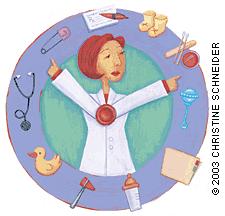
The struggle of a physician who is also a parent is exacting and ongoing.
Fam Pract Manag. 2003;10(9):80


It’s 4:45 on a Friday afternoon. You’re in a meeting with your hospital’s quality assurance committee. The chairman says, “Let’s finish this discussion tomorrow. I am sure we all know how important this is, and we have to get it done. See you tomorrow at 8:30.”
How do you explain that you have no day care on Saturday and that your son’s piano lessons are at 9 a.m.? How do you point out that your spouse is out of town or on call or that you are a single parent? Of course, you can try to explain such problems. But when you do, you are answered with The Day Care Stare – the “I-don’t-need-to-think-about-day-care-and-I-mind-that-you-brought-it-up-and-I-don’t-want-to-deal-with-it” stare. Often, the stare is accompanied by the comment, “I’m sure if it is important to you, you’ll be there.”
Or you are asked to serve on a committee you’d wanted to join. A secretary calls to tell you that the committee will be meeting at 5:30 p.m. When you protest, “That is the worst time possible!” (to attend, you’d have to close the office early so you’d have time to pick up your child at day care and pick up the babysitter by 5 p.m.), she replies, “All the other doctors can come then. They’ll have dinner provided, so it shouldn’t be any problem.”
The struggle of the working mother (or father) with children in school or day care is considerable and ongoing. That of a physician who is also a parent is even more exacting. Not only must you locate, pay for and monitor the care your children receive in day care or school, but your time-consuming efforts will likely be ignored or underrated by the medical establishment. Coordinating two-career families is difficult even when both parents share the day-care problems. Furthermore, studies indicate that even if a female physician is married to a man who shares the child-caring duties, most of the responsibility still falls to the woman.
Day care or after-school care usually ends at 5 p.m. or, if you’re lucky, 5:30. Since day-care centers are not open on weekends, the only child-care option for Saturdays and Sundays is hourly babysitting, which can be very expensive. And, anyway, who wants to give up their precious family time for weekend or evening meetings or office hours?
Having young children means rushing out of meetings at 5:20 p.m. and, often, missing evening and weekend meetings altogether. It means missing the semi-social gatherings that you need to attend to make medical and social connections. How many times do you think a physician can miss such meetings and have it not affect his or her career?
I have never seen a single male physician or a married one with a wife at home get frantic about a 5 o’clock deadline. Sure, they like to get home early, but for most fathers, someone else can be counted on to pick up the kids, feed them and put them to bed. Their words, “Certainly you can arrange something if it is important to you,” reflect only the ease with which they are able to make after-hours plans.
This assumption extends even further. Male physicians with partners at home easily offer food from home or volunteer their homes for meetings, confident that there is someone there to make the potluck dish or dessert or to clean the house and make sure the kids aren’t in the way. How often have you thought in despair, “How can I possibly go home and make a casserole for 12 for tomorrow with all I have to do?” How often have you wished you had a wife to help support your career?
And when you complain, you get The Day Care Stare. Not only have the other professionals or physicians neglected to consider the responsibilities you bear, but they resent your mentioning them. They think it’s fine that you’re a woman or a parent – but only as long as it doesn’t interfere with the “real work” of your career. And, since child care and related concerns are outside the job for real workers, they feel no need to consider them.
It is time for all members of the medical community to realize that the needs of physicians who are also parents must be respected and met. More women than ever before are becoming physicians: In 1993, 46 percent of student members of the AAFP were women. Having a family is part of being a family physician. We must not penalize those among us who bear child-rearing responsibilities in addition to professional responsibilities. We must respect – in words and in deeds – a parent’s need and desire to parent.